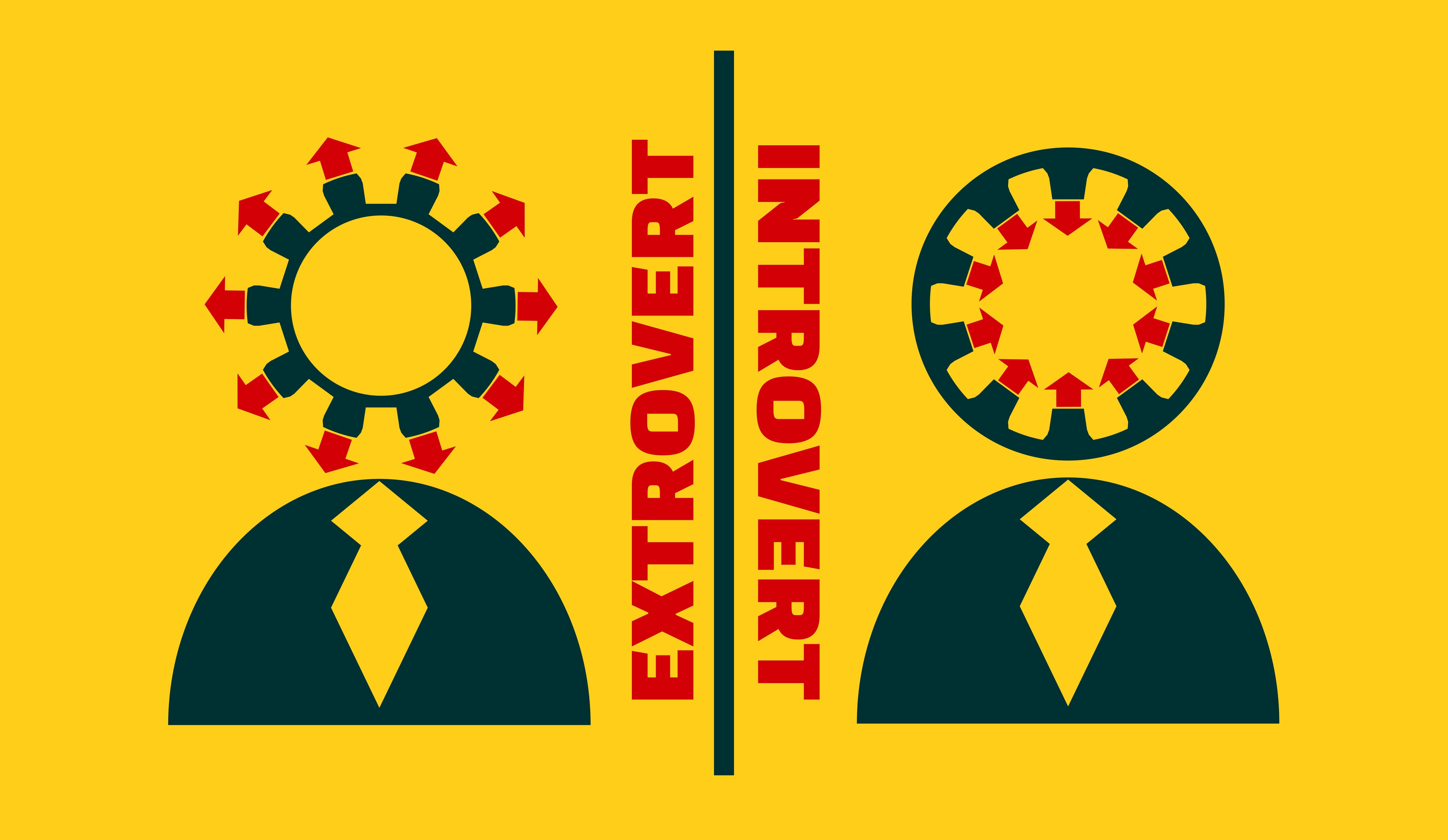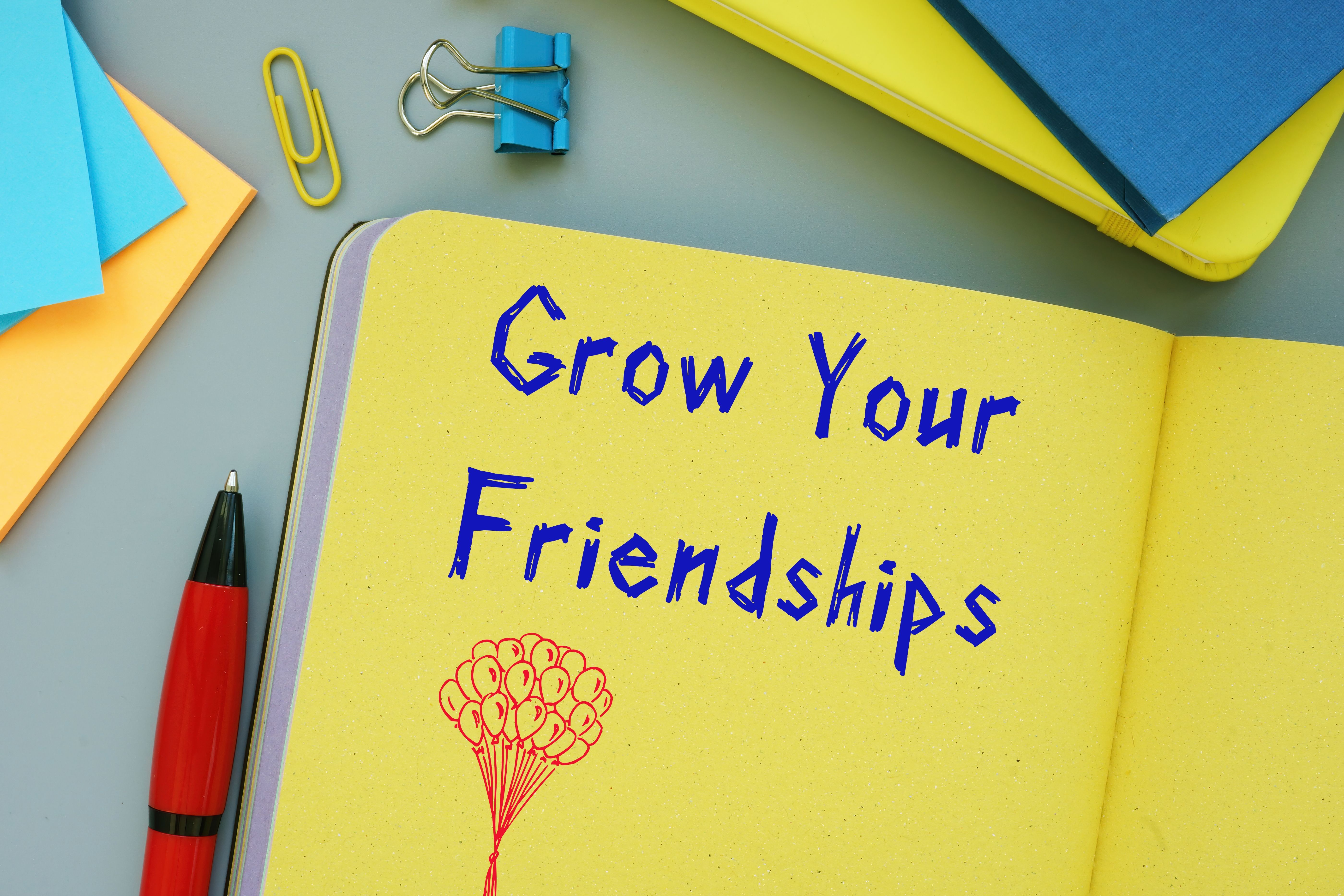An Introvert’s Guide to Surviving the Extroverted World
Almost one-half of the population is introverted meaning that most people are trying to survive in an extroverted world. If you are reading this article, you may be an introvert, or you may be wondering if you are an introvert. There is no denying that the world we live in was built for those who thrive in large social gatherings. Because of this, some people can feel shame or embarrassment over being an introvert. That’s in part because there are many incorrect assumptions about what it me...
Table of Contents
Table of Contents
Almost one-half of the population is introverted meaning that most people are trying to survive in an extroverted world. If you are reading this article, you may be an introvert, or you may be wondering if you are an introvert. There is no denying that the world we live in was built for those who thrive in large social gatherings. Because of this, some people can feel shame or embarrassment over being an introvert. That’s in part because there are many incorrect assumptions about what it means to actually be an introvert. What it means to actually be an introvert has often been misconstrued by the media. There are actually many strengths of being an introvert that you can use to navigate the extroverted world we live in. In this guide, we will walk through the true meaning of being an introvert, the positive benefits of being an introvert, and how to survive living in an extroverted world.
What Does It Actually Mean to be an Introvert?
Introversion is one of the basic personality traits that people may possess. It’s one of the Big Five personality traits, meaning that it is a stable quality that does not tend to change much over time. In fact, introversion and extroversion are considered the most stable personality traits. It’s time to learn more about what it means to being an introvert, rather than fighting against who you truly are.

The famous psychologist, Carl Jung, stated that there is no such thing as a pure introvert. Introversion is seen as being a spectrum, with extraversion being on the polar opposite end of the spectrum. There are different variations of being an introvert, meaning that some people are extremely introverted, and others only find themselves introverted in certain situations. Most people are not always introverted or always extraverted but will instead show signs of introversion in certain settings and signs of extraversion in other situations. There are also people who show signs of introversion and extraversion, which is often referred to as being an ambivert.
People who are introverted often have a preference for looking inward into their mind over the outer world of other people. As an introvert, you may have noticed you can get lost in your thoughts, often daydream, and are content spending hours thinking about things that interest you. Introverted people typically have the best thinking when they are able to be by themselves. You may also enjoy group discussions, but you may find that being around other people does not enhance your ability to think clearly, as it may for people who are extroverted.
If you are an introvert, you have probably noticed that you enjoy spending time alone reading, listening to music, or writing. These types of situations are less stimulating, which is what draws introverts to them. Introverts enjoy time alone because they tend to gain energy and are reenergized from being alone and reflecting on their experiences, whereas extroverts are rejuvenated after parties and social interactions. This is because introverts have a less active dopamine system in contrast to extroverts who have an overactive dopamine system. Dopamine is the neurotransmitter that gives us the feel-good energy to talk to others and be active. This explains why introverts require less stimulation and energy to feel good in social situations, therefore craving more close connections than large gatherings.
To others, you may come off as quiet or shy. If other people have described you this way, this may be a good indicator that you are an introvert. However, not all people who are introverts are shy. Introverts may not be quiet, but instead they are independent and enjoy working alone. Others who only see someone who prefers to be alone may attribute this to shyness.
One of the hallmarks of introversion is the introvert hangover. Have you ever heard of the introvert hangover? The introvert hangover describes the feeling you get when spending too much time with people and feeling grouchy, irritated, and run down. Introvert hangovers are often caused by overstimulation and situations where you must be social for multiple hours. While people need some degree of alone time in their life, introverts tend to need more than extroverts.
Introverts typically enjoy solitude, quiet, and calming environments. You may prefer a night at home rather than a night out in public or on the town. That’s not to say that introverts don’t enjoy going out and being in public. Introverts do enjoy public and social situations, but they typically enjoy them differently than those who are extroverts. You may enjoy situations where you are able to hang out with someone at a coffee shop rather than at a busy and noisy environment, like a bar. In situations out in public, you may also find that you don’t enjoy small talk with others. You may find yourself drawn to these types of events and social situations where you are able to truly engage in conversation with the person you are around.
Common Misconceptions of Introverts
A common misconception is that introverts do not like others, are shy, and are loners. This isn’t true at all. Introverts may love one-on-one conversations in calm environments. They may even enjoy large group settings, but these often drain them. Most research has also shown that introverts are happy and content with their own lives and their introversion. In fact, their introversion has been found to be a source of their pleasure and comfort, whereas extraverts draw happiness from outward gatherings and situations. Research has even found that introverts’ brains respond more favorably to internally generated brain activity than from exciting and novel social activities. For others, they may think that your tendency to enjoy being alone means that you do not like others. However, they are mistaken in their assumption.

Shyness is also different than introversion. They can look similar as people who are shy and people who are introverts commonly have limited social interactions. People who are shy typically feel self-conscious in social interactions and are fearful of what others will think of them. They worry about being negatively evaluated by others and may have diagnoses such as social anxiety disorder. On the other hand, many introverts may be skilled at handling social interactions, but they just have a preference for smaller groups of people or one-on-one conversations. Introverts may not find it difficult to interact in social situations, but they know it will be draining for them and so they choose to pursue social situations intentionally.
Is Being Introverted a Good Thing?
There are many positive qualities of being an introvert, meaning that there are benefits to looking inward and enjoying solitude over large gatherings. Intelligence is one of the greatest qualities that has been found to be associated with introversion. In studies of intelligence and giftedness, most gifted kids with high IQs have been found to be introverted. Perhaps spending time thinking over one’s thoughts is what gives introverts the intellectual advantage over extroverts.
Introverts are also often good listeners, as they tend to take longer to process information and can provide one-on-one attention to others more easily than extroverts. Introverts take time to fully listen in conversations before they speak, and they are observant of nuances and nonverbal cues. In contrast, extroverts are more likely to jump into the conversation before fully listening to what the other person has finished their train of thought. This skill of listening means being an introvert is a great benefit, especially when it comes to interpersonal relationships.
Introverts are also less impulsive than extroverts are. Because introverts need less dopamine to be stimulated, they often do not engage in risky behaviors or impulsive activities. Introverts often take time to formulate what they are thinking before they speak. They may be less likely to say something or do something they end up regretting.
Introverts may excel as friends, boyfriends/girlfriends, and spouses due to their listening abilities. Introverts tend to have several close friendships rather than a large group of friends. Introverts tend to be picky with their friends, as they choose friends who will add substance to their lives rather than drain energy from it. As romantic partners, being an introvert is a great thing. Introverts are often available at the end of a long day to listen to their partner’s day without feeling the need to talk too much about themselves. Because of this, introverts are extremely loyal and committed to their friendships and relationships. They make ideal friends, partners, siblings, and children.
Famous Introverts
Have you ever worried that being an introvert will hold you back in some ways? Many people who are introverts are concerned they may not have the same opportunities as extroverts or will not be as successful in life. This has been disproven time and time again with the many successful people in the world who are introverts. The strengths of being an introvert may also make it more likely that you will be successful in life.

Given that introverts often engage often with their thoughts, they can have a creative edge over those who are extroverted. They may be able to come up with unique ideas for plays, movies, and books because of the time they spend in their minds. Because of this, many introverts have gone on to develop good art or literary careers. J.K. Rowling, the writer of the Harry Potter series, is one of the most famous literary writers who is also introverted. She has claimed that being introverted was one of the reasons she was able to write the Harry Potter books and successfully be creative.
Careers are possible in areas you wouldn’t think would intrigue an introvert, meaning that introverts are able to have careers that require being in the spotlight. There are numerous famous actresses, actors, and musicians who have thrived in the spotlight despite being introverted. For example, Emma Watson, Meryl Streep, and Angelina Jolie are self-described introverts who prefer to be in solitude rather than around other people. Additionally, the famous musician Lady Gaga has been called an introvert as well. They have learned how to use their introversion as a strength to perform in unique situations, by saving their social energy and expending it at their job.

If having a career in business or politics is something that interests you as well, that is possible even as an introvert. Going along with the intellect and creativity of being an introvert, introverts are often skilled at making analytical decisions often needed in business and politics. As leaders, introverts tend to be particularly skillful as they have focused conversations and are good at developing relationships with their employees. They are able to think through difficult decisions carefully and while considering all of the possible outcomes. Some famous business introverts include Bill Gates, Steve Wozniack, Larry Page, and Mark Zuckerberg. All have excelled in their careers as business owners, CEOs, and developers of innovative startups. As for politics, Barack Obama and Hillary Clinton have both been thought of as introverts, meaning that they prefer one-on-one conversations and discussing politics with others.
How to Survive an Extroverted World
Now that you know what it actually means to be an introvert and some of the positive qualities of being an introvert, let’s talk about survival strategies for living in an extroverted world. There’s no denying that the world we live in has been built for extroverts. The society that we live in values networking, socialization, and spontaneity. Many aspects of modern life cater to the strengths of extroverts, but that doesn’t mean that you can’t survive in the world as an introvert. In fact, many of the strengths of being an introvert, can be assets to surviving in an extroverted world. One of the keys to thriving as an introvert is working with your introversion rather than fighting against it. The more you are able to work with your strengths of being an introvert, the more you will be able to use those strengths every day. In the following sections, read through for tips and advice on how to use your strengths as an introvert, meaning how you can use your personality qualities to interact in various social situations.
Surviving Dating
To many introverts, the idea of dating seems to be one of the least attractive options in the world. As an introvert, you’re having to fight against your instinct to spend a lot of time in solitude, by actively going out into the world and being social. Instead of weekend nights in, this often means having to devote the time and energy to going out on dates.
If you’re an introvert, there are some things to keep in mind when dating that will help you survive. First, it’s important to know your limits when dating. While extroverts may tend to be excited by the act of going on first dates, introverts may find these situations draining. As an introvert, you will probably benefit from only scheduling 1-2 dates per week. Scheduling anything more may leave you feeling unmotivated, irritable, and even annoyed with those who you encounter on your dates.
Online dating and the world of apps can be particularly draining to introverts. Using apps as a way to date others can have some benefits because it requires less in-person interaction which may be less draining for introverts. On the other hand, using apps and online dating means you are constantly connected to others through your device. Feeling like you have to always respond to one or multiple people in the world of online dating can lead to burnout and fatigue quickly for introverts. Setting boundaries in place for using these apps can be a good idea. Devote a specified amount of time each day or on a certain day of the week to converse with people on these apps. This can help you maintain your happiness and time alone, while still remaining connected and pursuing online dating.

Be sure to schedule alone time before and after a date to avoid the introvert hangover. Dating can be stressful, and it can take a lot of energy from you. Before the date, it might be helpful to not have any other social events. Instead, take some time to yourself to do an activity that recharges you, such as working out, reading, or watching a television series. This will help you avoid feeling drained before you even go on your date. After your date, also spend some time taking care of you and doing things that you enjoy. This will help you recover from the additional social activities you had during the date.
When you are on the date, think about the topics that are easiest for you to chat about, and that require the least amount of energy. Many introverts are able to discuss great date topics, such as travel or their work, without expending too much energy doing so. Before your date, keep in mind some topics that are generally easier for you to talk about with other people. There’s no need to plan out the conversations you will have around those topics, but instead, think about the conversation topics you can have. This will help reduce your first date nerves and provide you with backup conversation topics if things get quiet.
Ask open-ended questions to keep the conversation going rather than questions that only require a yes or no question. When people are asked open-ended questions, they tend to respond with longer answers and may also ask you some follow-up questions as well. Asking these types of questions also shows that you are socially skilled and are interested in your date. If you ask more open-ended questions, you will find that this takes off much of the pressure for you of having to keep the conversation going.
Surviving Friendships
Introverts make great friends. Introverts are able to listen to their friends, be observant, and often have a small but quality social circle. Finding the people who get you can be a challenge for introverts. You may feel like you want more friends but also have trouble wanting to go out and socialize, knowing that it will be draining for you. Here are some steps you can take to making and keeping close friends.
If you want to add some new friends to your social circle, think about people you already know. There may be people in your workout class or at work who seem like they would be good friends, but you haven’t gotten a chance for them to move from being an acquaintance to being a close friend yet. Starting by reaching out to people you already know can be easier than meeting up with someone whom you have limited conversations or interaction with.
Many introverts may be shy and avoid making the first move because they prefer for others to come to them. The process of making new friends can be challenging because of our limiting beliefs and thoughts about what others may think about us. Even the most confident extrovert experiences these feelings at times. Instead of putting too much thought and contemplation into it, which is easy for introverts to do, go ahead and make the first move when trying to reach out to friends.

Let others see you for who you truly are. You want people who will be attracted to who you are as an introvert, not those that will think it is weird. Being vulnerable by telling people that you enjoy spending a lot of time alone can be important for many reasons. Sharing this vulnerability as an introvert means you feel comfortable enough with this person to show them who you really are. Others often feel more connected when you are able to reveal vulnerable pieces of your personality. Also, this lets people know what they can expect from you as a friend. They will notice that you may enjoy more time being alone and that’s part of your personality. This can help because they may suggest different activities with you, knowing that you are introverted.
Notice how you feel around potential friends. If you end a friendship date and feel completely drained after interacting with them, take a step back and consider why you are feeling this way. Was it because the activity you were doing was draining? Or was it that the person you were spending time with was draining? Although introverts may feel drained after long social interactions, you should ultimately spend time with people who make you feel good. If you’re noticing that someone is taking away more of your energy than they are worth, allow yourself to step out of that friendship. The last thing you want in your life is someone who is going to drain it more, than someone who will add meaning to your life.
Know that feeling uncomfortable will go away after time. Usually it takes a few times to get to know who your potential friend actually is. These feelings of awkwardness often come in the beginning because we feel nervous about meeting someone we don’t know well, and it can be hard to show others who we really are. Over time, these feelings will likely fade, and you will feel more comfortable opening up to them. When you’re able to be more comfortable with other people, you’ll also find that these social situations are less draining.
Be honest in your communication with friends. Many people enjoy a night in after a difficult week at work. This is often doubly true for introverts who need their weekends to truly recharge. For friends of introverts, they may be unsure if their introvert friend is needing time to recharge, if they are mad at them, or if they would prefer not to be friends. Although it’s not what introverts intend, it can lead to rifts in friendships with introverts. The best strategy is to be open and honest in your communication about why you are turning down plans with friends. Let them know that you are feeling like you need to recharge and suggest a different meeting time or activity in the future if you feel up to it. This will let your friend know that it is nothing personal, but that you need some time alone.
Surviving Parties and Social Gatherings
Parties and large gatherings are a natural part of life. Whether it’s a friend’s birthday party or a wedding, there are going to be social events that you will feel you have to attend. Knowing how you can attend these events without completely depleting your energy stores is an important task for introverts. Navigating social events and parties can be a similarly difficult fear. Here are some ways you can manage parties and other social gatherings.
Arrive early to the party to avoid walking into a full crowd. Being there early means you can find a spot to sit and can avoid having to insert yourself into a conversation with a lot of people. As people start to come into the party in small groups, it can feel much easier to begin conversations with them.

One solution to navigating large gatherings is to find your partner in crime for these events. Ideally, this is someone you are already close with and have gotten to know pretty well. Going into these parties and social gatherings with an ally can help take some of the pressure off of you when it comes to talking in social events. You don’t want to stay glued to their side all night, but it may be an easy way to enter a social situation you feel hesitant about.
Help out the host of the party. Remember how introverts tend to thrive in situations that are one-on-one? This can also be used as a strength at a larger party. Often, hosts or chefs at parties need extra help with setting the table or putting the final touches on the meal. At these events, kindly approach the host and ask if there is anything you can help with. If they kindly decline, you can keep the conversation going before moving on to converse with others at the party. The host will likely have a positive impression of you and may accept your help in circumstances.
Look for others who are alone or who are in pairs conversing. It’s often easier to strike up a conversation with someone else who is alone or with one other person than with a big group. This is one of the helpful reasons it’s important to arrive early, bring an ally, or talk with the host upon arriving. It can be easier to talk to individual people rather than to large groups of people. Bring up how they know the host as a simple way to form a connection with someone at the party. If you do find yourself needing to insert yourself into large conversations, try to jump in on the conversation topic before introducing yourself. This often feels more natural and less awkward.a
Take breaks from socializing. Throughout a party or an event, take a few moments to yourself to allow yourself to recharge. This may mean going upstairs during a party or just taking a few extra moments to yourself in the bathroom. You can also take some time by talking with kids or playing with the host’s pets at the social gathering. This can often be a socially acceptable way of recharging, and it can also be a good conversation starter. It’s much easier to recharge your battery when it is half-full than when it is already empty.
When all else fails, make sure you have an exit plan. The chances are that you will be drained before other people are, but it can be difficult to say that this is your reason for leaving. Instead, have another reason for why you have to leave, whether it is that you have another plan or you have a pet you need to go home to take care of. Before you leave, don’t just ghost everyone at the party or social event. Be sure to say goodbye to the host when you do leave and any other people who you may have had close conversations with you.
Surviving the Workplace
Workplaces can be a common area where introverts tend to have challenges. Finding a job can be a difficult feat for someone who is introverted because it often requires networking and interviews. These tasks can be draining and require extra energy of someone who is introverted. After getting a job, staying in the job can also be challenging for someone who is introverted. If you are in a job that requires frequent social interactions, you may find yourself feeling drained at the end of a long day or becoming irritable after having too much people time throughout the day. All of these challenges can make it difficult to survive the workplace as an introvert, meaning you will need to take additional steps in the workplace. Here are some things you can do to thrive in the workplace as an introvert.
When it comes to finding a job through networking and interviews, this can be a stressful part of the job search for introverts. It can be hard for introverts to flip on their people skills and step out of their comfort zone. To effectively network, it can be helpful to look for situations that require one-on-one networking rather than large group networking. An introvert’s worst nightmare may be networking in-person at a large event. If possible, try to reach out to individuals you are interested in networking with. Given that you thrive as an introvert in one-on-one conversations, you may find that these networking strategies are much more comfortable for you. Utilizing technology can also be helpful when looking at ways to network. It might be easiest if you reach out to a potential colleague through email or LinkedIn rather than through telephone.

Finding a job that emphasizes your strengths can also be a helpful aspect of the job search. Most introverts cringe at the idea of being in sales and having to cold call random people throughout the day. Other introverts may find that they crave social interaction in their job but would prefer they have conversations in smaller groups. If this sounds like you, look for jobs where you are more likely to have conversations with smaller groups, such as being a therapist. If you would prefer a job that has greater degrees of solitude, there are many remote opportunities that do not require much social interaction. Looking towards what types of situations you thrive in is important to surviving your job as an introvert.
Once you are in the workplace, you may find that you have difficulties interacting with coworkers. This can be especially true if you are in a large workplace where there are many social gatherings. In the workplace, it can be helpful for introverts to approach social situations similarly to how they approach them in their social lives. Focus first on developing closer friendships with one or two colleagues in your area. As you start to become more comfortable with talking with them, you will likely feel more comfortable reaching out to other people. When you have close connections with a few people at your job, you will also likely feel more comfortable with attending larger work events. If you do have to attend a large event at your job, make a game plan prior to going to the event. Maybe you will plan to meet up with one of your close colleagues before so that you can enter the event together. Or maybe you will have a plan to attend the event for a certain amount of time before leaving for another commitment. These plans will help you feel more prepared for the social event when it is time to attend.
Some introverts also struggle with asserting themselves in situations that require it. Some situations that require assertiveness include asking for a raise or promotion or discussing difficult topics with coworkers. You may also have to be assertive in meetings where multiple people are talking, and you want to make sure your point is heard. For these types of situations, it can be helpful to use your strength of intuition and contemplative thinking. Before a meeting or before asking your supervisor for a raise, think about your main points that you would like to come across in your conversation. You may even benefit from preparing a conversation or having practice conversations. Really pay attention to your tone and assert yourself with confidence when you are talking. Try to maintain good eye contact, posture, and confidence in your voice. These things will develop over time as you have more practice in these types of situations.
Lean into Being an Introvert
What it comes down to is leaning into being an introvert, meaning that you know your strengths and are able to use them. This means trusting your instincts and knowing what you need to truly be happy. The world was built for extroverts, but introverts can be just as if not more successful in social situations. It simply takes knowing yourself and your strengths as an introvert to navigate these situations. If you need to spend a night alone, that is okay, and it’s nothing to feel guilty or ashamed about. Instead of placing that pressure on yourself, think about how you are engaging in self-care and using what you know about yourself to be the best you can be. Once you finally know who you truly are and what you need, then you will be able to devote your time to the people and situations that truly deserve it. This will lead to you feeling happy and free to be an introvert.
About Dr. Carrie Jackson
Dr. Carrie Jackson is a contributor of HolyJot. Her primary interests are to increase access to evidence-based mental health treatments for children and adolescents, providing specific information to parents and individuals with ADHD.
Carrie is a graduate of West Virginia University with a doctoral degree in Psychology, and a specialization in Clinical Child Psychology. Carrie has worked as a therapist and evaluator at several children’s hospitals, providing care and treatment to clients with ADHD, Autism Spectrum Disorder, and anxiety. She has also worked with children with chronic medical conditions, providing supportive mental health care to children with cancer and burn survivors.
Although originally from South Carolina, Carrie has lived in two countries and four states. She enjoys hiking, traveling, and trying new recipes.
